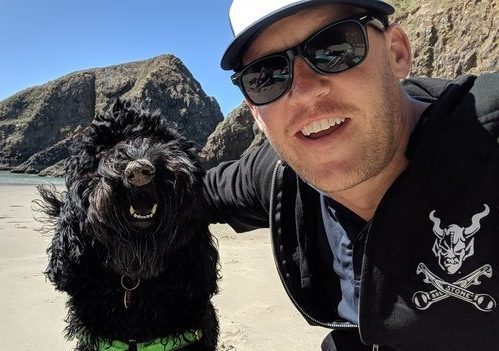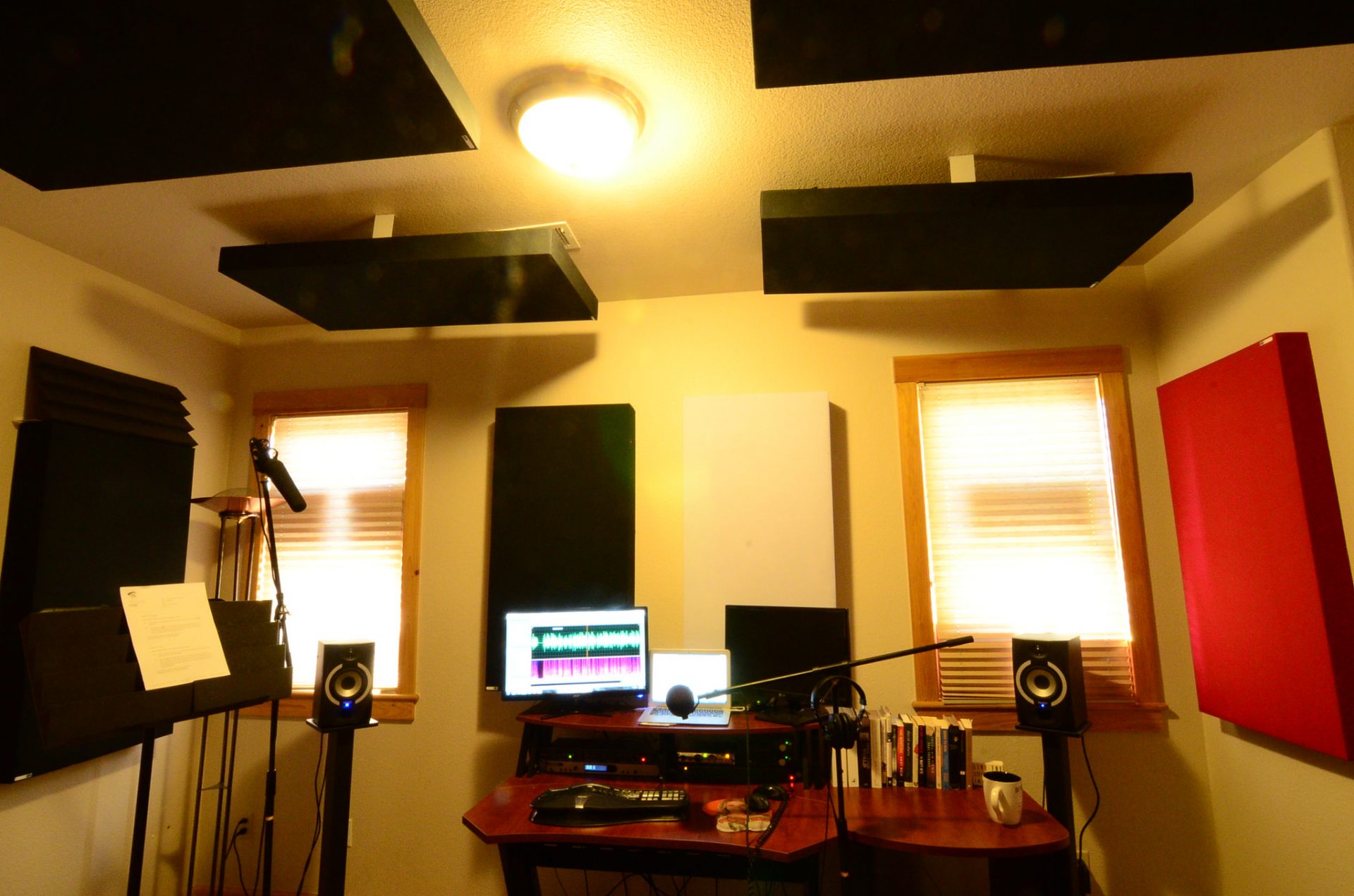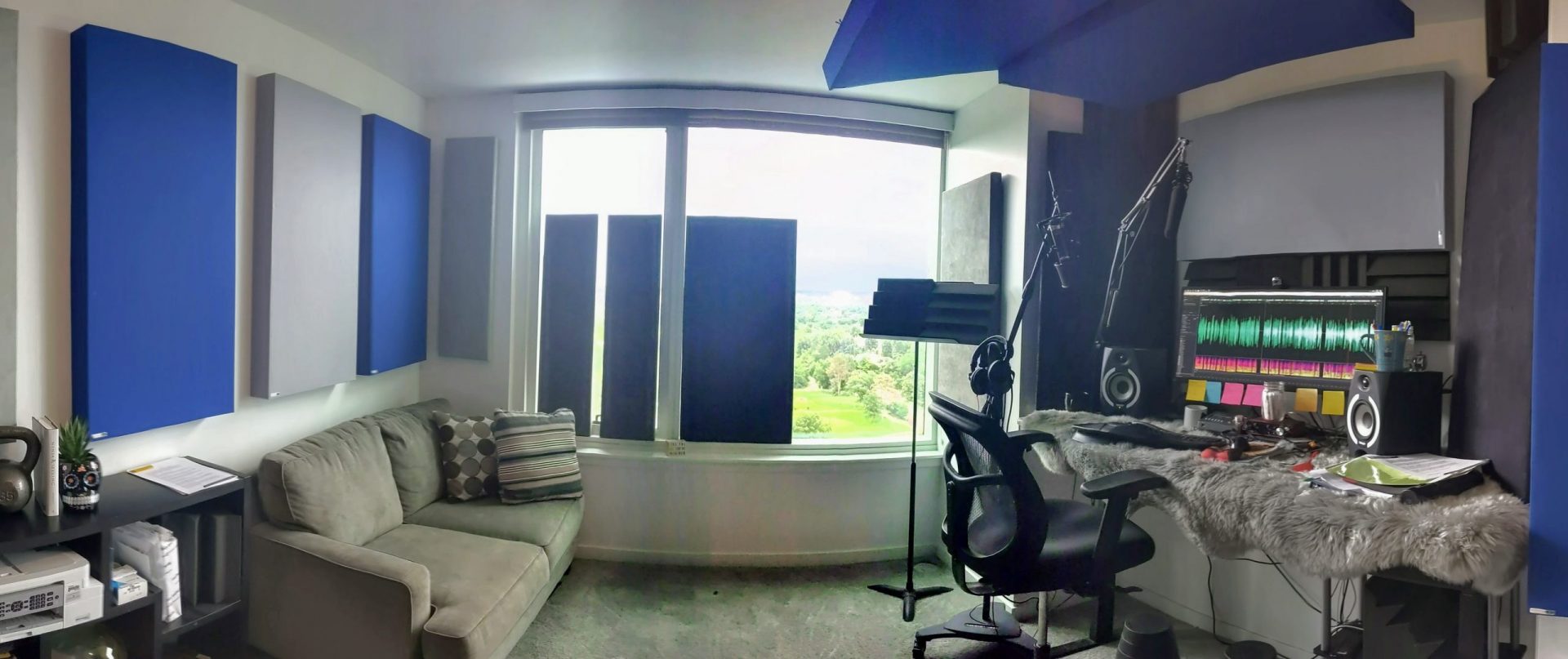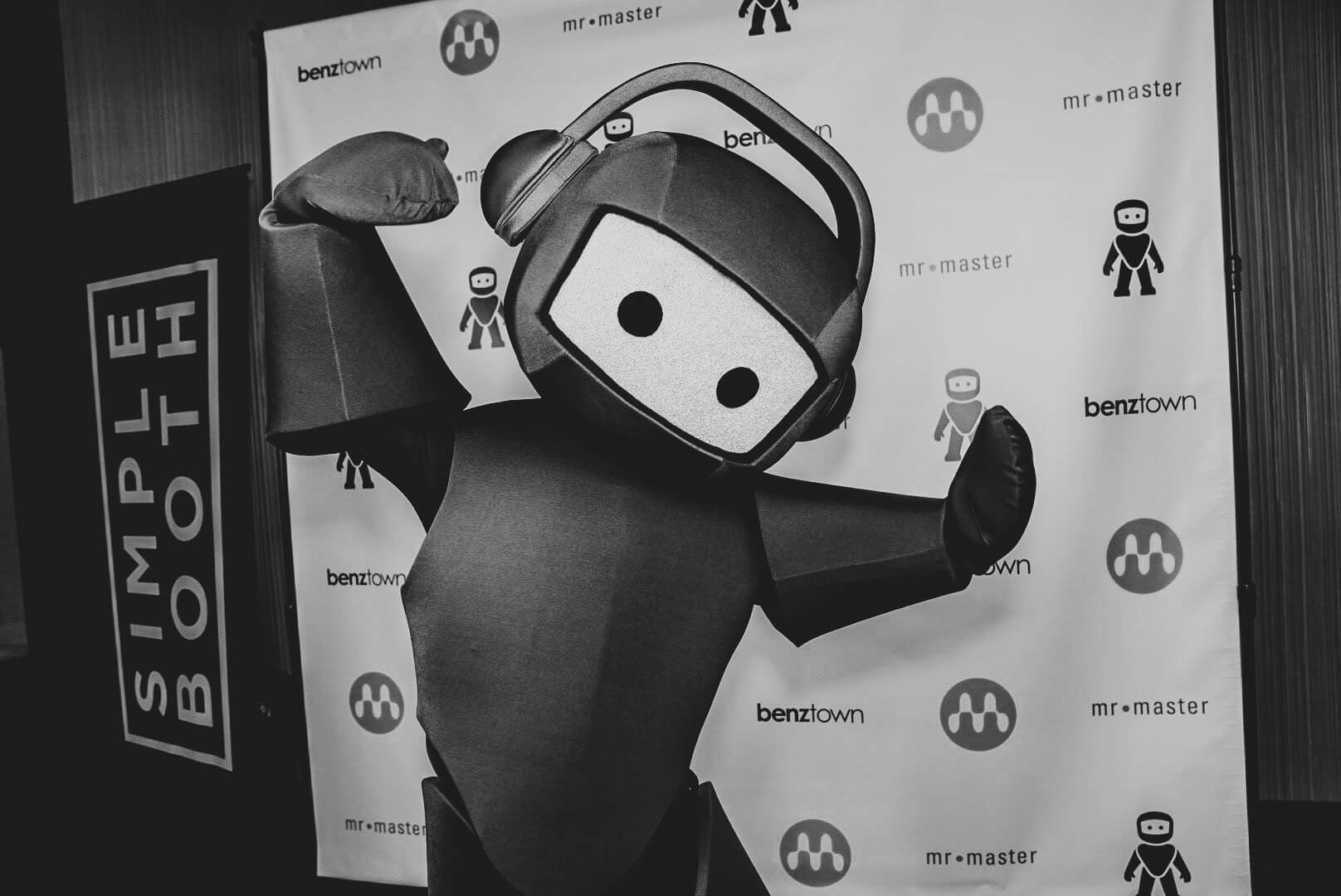Behind the Mic: Drew Carpenter

Drew Carpenter has been behind the mic since before he graduated high school. He started at iHeart of Northern Colorado and by the time he left 17 years later, he was voice tracking 4 different dayparts on 4 different stations, all in the same market! For the last 5 years, he has been doing VO exclusively. You can hear him voicing stations across the US and even one in Sri Lanka (91.4 The Fox, if you are in the neighborhood). Most recently, you’ve heard Drew’s voice on spots for Hot Wheels, The Oklahoma Beef Association (It’s What’s For Dinner), Kawasaki, Circle K, and many others. He now lives and works in Denver and sometimes puts on pants.
What are you up to presently (freelance/on-staff at a station)?
I’ve been a full time VO for 7 or 8 years now, but held on to a few voice track shifts for iHeart Northern Colorado, that I did from my home studio, until about 4 years ago. I currently split my time between commercial, radio imaging, and various other corporate creative type VO work. There are things I love about each genre of work, but after 18 years in radio, the business will always hold a special place!
What do you love about your job?
My favorite part of radio imaging work is definitely getting to collaborate with the station staff to build a shared vision of the station’s personality. If its personality is not intentional, because the programmers and VO are out of sync or don’t understand each other’s vision, things get bland very quickly. But when things are in sync, it really elevates the signal to something more than the music, that the listeners really bond to.
I also love getting copy that inspires some good ad-libs and improv to draw a laugh. Laughter is essential medicine and often seems in short supply. The more laughs the better, especially for people stuck in traffic or between Zoom calls in 2020.
Listen to Drew’s Demos:
How did you get started as a VO actor?
It was a bit of an accident, but I feel like I would have found my way there one way or another. I was having a frustrating month at the station, so one afternoon I randomly fired off some resumes. One was to a local recording studio. 6 months later, I got an email requesting an audition. They were casting for the voice of Arky the Bird, the mascot for Ark Thrift Stores.
I knew absolutely nothing of voice over, but said, “what the hell” and popped into the studio to read for the part. Somehow, I shortlisted down to the top 2. My total ignorance of voice over must have stood out to the producers. Maybe there is a lesson in there.
I didn’t book it, but I did learn it was a SAG job. A little more investigation turned on a light bulb; maybe there was a way I could take a more entrepreneurial path and also get to have fun in the studio. 10 years later, it’s working out better than I would have ever hoped for.
Any memorable gigs recently?
I just read a few pages for 89.1 The Point / WBSU, which is SUNY Brockport’s college radio station. I look forward to reading for all my stations, but WBSU is unique. The students are all brand new in radio and they have so much excitement and enthusiasm about what they put on the air, it really takes me back to my first years in the business. And since the station is funded by the university and decisions aren’t based on ratings and revenue, it’s fully staffed and there are few rules. The students play what they want and write hilarious liners that are so irreverent and creative. We totally have the same sense of humor, which shows how much I’ve matured since college.
In the end, producers have literally endless choices at their fingertips, so when they pick you over all the other voices, it’s a huge honor no matter what the gig is.
Who are your VO idols/mentors?
I would never have stuck with it if it were not for a few very kind and generous mentors in the business. The first year or two pursuing voice over is exciting, but once you put more skin in the game and start really trying to make a go of it, the next few years can be much tougher. You audition endlessly, don’t book very much, and start to realize what you are up against.
It’s all totally worth it after a few years, when you get some traction and build up a client base, but you will never make it that far unless you have people in your corner to remind you that there really is gold at the end of the rainbow and it’s not all just a mirage.
If you weren’t doing voiceover, what else do you think you’d be doing for a career?
I started down the road to being a pilot, going to flight school in my early 20’s. My Dad is a retired American Airlines pilot and I still love flying. In the end, late night radio fun won out over the clear headed early mornings required of professional pilots, so I eventually quit flight school to double down on radio. Now I just fly for fun. A few years ago, my dad and I went in on a small, 2 seat, open cockpit biplane, that we both still fly regularly. It requires a very different kind of thinking than VO and is a great way to reset after all the booth time. Best of both worlds, now, I suppose.
What did it feel like the first time you heard your voice on the radio/television?
KSME was my first station and I’m still very close friends with the crew that formed there. We had the same 4 core staff members for over a decade, which in radio, is very unusual. When I first got put on the air, I’m sure I was a massive dork about it. I think I was about 19 and totally unable to hide how stoked I was. Voice tracking overnights in Fort Collins for $10.50 a shift, the fame was really overwhelming. Thanks again to all my non-radio friends for not murdering me when I made them stay up until 3am to listen to me suck between Kelly Clarkson singles.

We like to call this “The Drew View”
How has new technology changed the way you work?
The Universal Audio interfaces (Apollo and similar) have probably been the most significant change since I started. I’ve only been at this for 10 years, so functionally, everything else is about the same, but the real-time processing and hardware emulation is something that has really come into its own in the last few years. The fact that you can have a full rack of gear, that processes audio in real time and sounds the same as the hardware, in a pocket-sized (well, cargo pocket-sized) device, is really remarkable. You are definitely not going to take an analog Manley VoxBox on a plane!
What gear do you use at home and on the road?
UA Apollo and a Sennheiser 416 at home and on the road. I love analog gear; the dials and meters are very sexy, but it’s just not practical anymore. I bounce between two studios plus the occasional hotel room; matching settings on different, analog gear is arduous. There isn’t much upside to analog anymore, minus the sexy.
I run my 416 into the UA 610B plugin on the Apollo and then through the Manley VoxBox for some light compression and a little de-essing. The SSL 4000 E channel strip also has a fantastic gate/expander, when you need it.
Which production system do you use and why? Any favorite plugins?
Adobe Audition. Adobe’s spectral view and auto-heal features are incredibly handy and I think the workflow is very fast and well thought out, though I’m not nearly as familiar with any other DAW. Izotope Nectar (especially the de-click) is very good, but you have to be careful or those tools will cause more problems than they solve. That’s true for really any processing though.
Have you ever had a voice coach? Would you recommend it?
Quite a few and I would consider it essential. Some techniques have been helpful, some harmful. I’ve also found taking a break from coaching is important too. Sometimes, you can get too into your own head and it will mess up your reads. Confidence is essential and you won’t be confident if you are in your head and second guessing yourself. It’s like a golf swing. You can’t think too much while you are swinging or performing. It’s all about building good habits or muscle memory that is automatic when the time comes to perform.
How do you market your services to potential clients?
It’s just a matter of finding buyers and getting their ears on your demos. If you have competitive demos and present yourself professionally, a certain percentage of them will eventually hire you. The more you connect buyer’s ears with demos, that more you will earn. The hard part is finding a way to do it efficiently and consistently. Auditioning, email, social media, paid ads, in person networking. It all works, but certain people will be better at certain channels that fit their personality. It takes a while to figure out which work best for you and which methods you enjoy or can at least stand doing every day. The trick is doing any of them consistently and constantly working on improving your presentation and process.
That said, once you have a client base, I’ve found much greater returns will come from going above and beyond to help them and remarketing when you fall out of touch. I forgot where I heard it, but have always remembered the quote, “treat your clients like gold, because they are” and I have that posted in my studio. I’ve noticed lots of freelance creative people (I’ve also fallen victim to this) tend to spend too much time wrangling new clients and not enough time staying in touch and being helpful to their past clients who already know, like, and trust them.

Studio #2 for Drew!
When it comes to VO work, studio & gear, what are your most ingenious methods/discoveries for saving time and cash?
Learn to use Hotkeys and Macros. The easiest way to get more work and auditions out the door is to be a faster editor and to streamline your business processes. AutoText Expander is a very cool tool too.
What is the best voice processing trick or voiceover technique everyone should know?
This is a timeless favorite of mine: https://www.youtube.com/watch?v=oHg5SJYRHA0
Do you have a different approach to reading radio imaging copy as opposed to TV/Radio commercial ads?
Absolutely. Each needs a unique approach and it takes a while to learn the quirks of each industry that employs VO. Part of it is developing the knack of knowing what the writer heard in their head when they wrote the copy and also, having a good idea what the finished project will look or sound like. There is a lot of nuance to every genre of work you must be familiar with before you can be competitive; be it imaging, commercial, narration, or anything else. Producers only want to work with talent who understand the dynamics of all the elements, audio or visual, right off the bat and can give them what they need to do their best work.
Can you offer 3 helpful tips for newbies trying to make it in the voiceover industry?
Don’t expect it to come fast. From day one you are competing with people who have made voiceover their life’s work and have been at it for decades. It’s a very difficult industry to get a foothold in, but absolutely can be done and is worth it for those who do. Voiceover is a learned skill and there is a place for every voice type, somewhere in VO. So, if it’s what you want to do, don’t give up!
Find someone working at the highest levels who is willing to help you. Preferably, someone who is a voice talent or producer, not a full-time coach. Then, scheme all you can to get clients to take a chance on you. Break rules and keep doing everything you can think of to succeed. I was told early on, “a VO career is a marathon, not a sprint” and that’s excellent advice.
If you could go back in time and hang out in any decade which one would you go back to and why?
Probably the 80’s. From what I’ve heard, it was a golden era in radio and I really like the music. But Seinfeld wasn’t around, so I’m not sure what my jokes would be based on. Tough question.
Favorite 2 pizza toppings?
Nachos with some habanero peppers and an IPA. Pizza optional.
If you could invite one person to dinner, living or dead, who would it be?
Probably a dead person, that would be a first! Serious answer: Sam Harris or Joe Rogan.
Connect with Drew:
;)